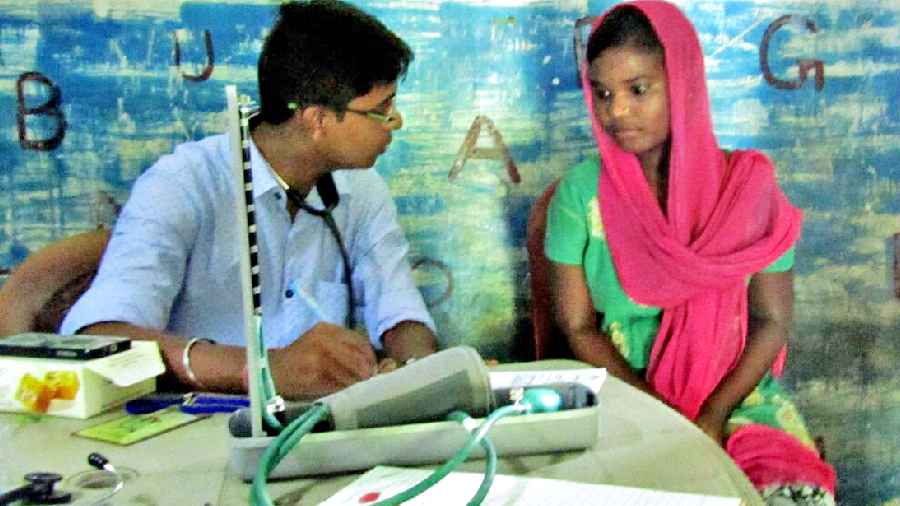There is a common saying that nothing should be imposed on a student regarding career choice. This is only partly correct. A school-leaving boy or girl, more often than not, lacks the maturity to make this decision and it is not difficult to be swayed by advertisements, social media chatter and half-baked information flying all over the place.
Guardians or teachers should help at this point by meticulous assessment of the student’s skills, aptitude, personality and likings, balancing those against the pros and cons of a particular career path. This whole process requires a deep understanding of the ward’s psychology and abilities. An authoritarian attitude and too much pressure may destroy a career forever. Parents should also refrain from thrusting their own unfulfilled wishes onto their children.
Medicine is more of a calling than a profession, as William Osler famously said. The exact words of the Canadian physician — who was also one of the founders of Johns Hopkins Hospital in the US — and teacher are: “The practice of medicine is an art, not a trade; a calling, not a business; a calling in which your heart will be exercised equally with your head.” Those who choose a career in medicine ought to remember his words throughout their life.
Ask yourself if the thought of saving a life or curing the ailing makes you happy. If the answer is yes, then go for it. You may not become hugely wealthy by practicing medicine but if you are a good doctor, you will always have stable earnings. You will also earn respect and recognition in society like few other jobs can yield.
It is true that of late there are examples of increasing disillusionment, distrust and disregard for the medical profession throughout India. That and the reasons behind it is another story. For now, suffice to say, the extraneous will never be in your control. The thing to remember is, if you do well and with compassion that which is in your control, you would have done your job well.
A student of medicine should be prepared to be a perpetual student. And remember, here, tenacity is more important than merit and practice is more important than talent.
Compared to students of some other disciplines, medical students should be ready for a longer growing phase with five years of MBBS and about six years of speciality and superspeciality training in many cases. A comfortable stipend is available from the time of internship and you will not have to monetarily depend on your parents after clearing the MBBS. You can also get a government job and have a quality general practice in well-selected places from this stage.
Never compare the stages of your journey with other career paths in terms of stability, foreign travel and earnings. Each and every career path has different milestones. It is very natural to get perturbed by the early success of friends pursuing other professions. But try to resist that and maintain equanimity.
Always remember, there are no shortcuts in medicine. Enjoy every stage of your long journey because you will learn new things from every patient you handle. Stay focussed on your ultimate goal of being a good, honest and humane doctor, diagnosing and treating distressed people.
Make a habit of maintaining stress-relieving extracurriculars as this long journey may at times cause fatigue. Medicine is an ever-changing art and science. So, to deliver your best to your patients, you have to read all the time and stay updated.
Speaking about the qualities a medical student should nurture, my teacher, the legendary physician DrFarokh Erach Udwadia, enumerated these — competence, humanity, honesty, integrity, charity, humility, judgment, and equanimity. To these I would like to add ethics, which broadly encompasses the moral values a doctor will need to maintain throughout his or her career.
Remember the four pillars of medical ethics. Autonomy or respect for the patient’s right to self-determination, when capable.Beneficence or the duty to do good.Non-maleficence or the duty to not do bad. Justice, which is about treating all people equally and equitably. As in any other field, throughout a medical career, there will be multiple provocations and threats to these virtues. The way you resist those will be the test of your mettle.
And, of course, be humble. Humility does not mean keeping unjustly silent when you need to protect against unethical things. Maintainyour integrity, never compromisewith your self-esteem or dignity. By all means charge a fee for the job undertaken, but also remember what Dr Udwadia has said about never refusing a patient who seeks your help but cannot afford your fees.
Lastly, remember that society recognizes a complete package of knowledge, skill, dedication, honesty and straightforwardness for what it is. If you are a medical aspirant, strive to be such a package throughout your career.
The writer is professor of critical care medicine at Calcutta’s R.G. Kar Medical College and Hospital











